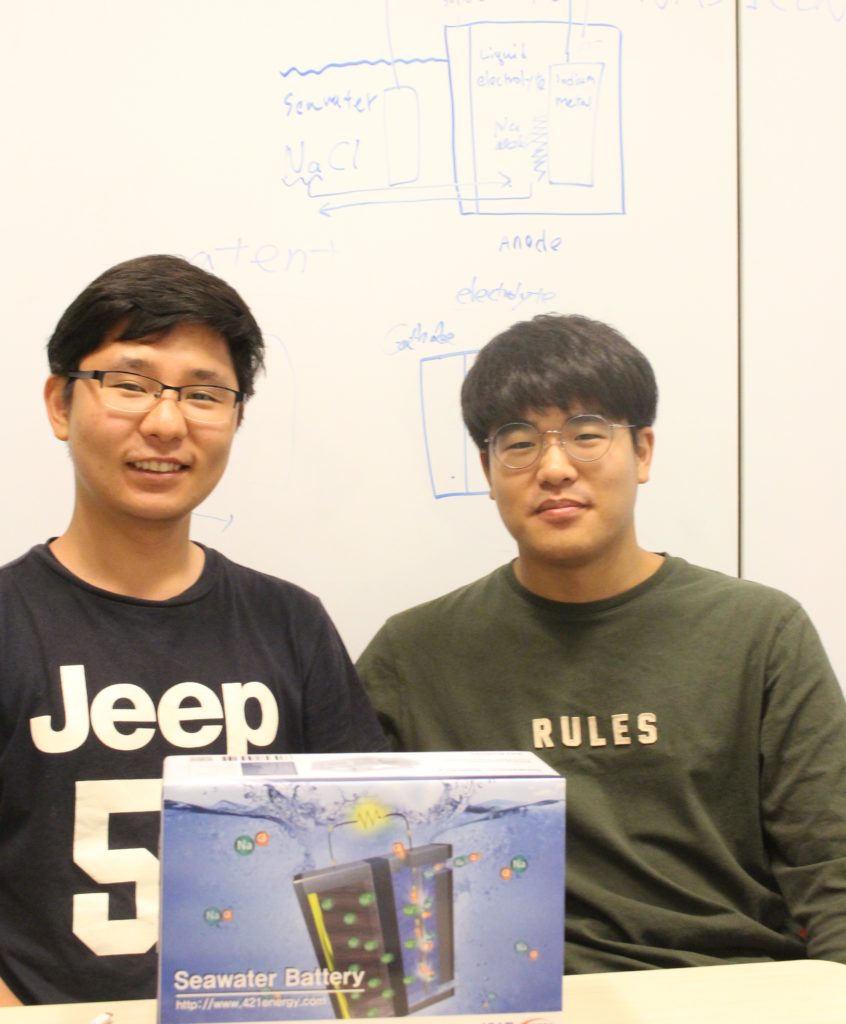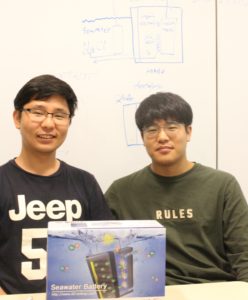 In June, graduate students Woo-Seok Go and Jeong-Sun Park arrived in Berkeley with the Seawater Battery, a novel product designed to combat environmental problems and increasing electricity demands.
In June, graduate students Woo-Seok Go and Jeong-Sun Park arrived in Berkeley with the Seawater Battery, a novel product designed to combat environmental problems and increasing electricity demands.
Unlike a traditional battery, the Seawater battery produces charge through the flow of the sodium ions found in seawater and can additionally be used for water purification and desalination. The battery uses seawater as the cathode and leaves the anode empty — two standard battery parts that typically represent more than half the material cost of a battery.
As a result, the battery is more cost, weight, and size effective than a lithium battery. Although there are other batteries that use seawater, those batteries still use a traditional cathode and use seawater as the electrolyte and are still comparatively high in cost and negative environmental impacts.
“In order to (research) more deeply, we need more people and labs to collaborate with. We want other scientists to participate in this research on seawater batteries,” Go said.
Go is a first-year and Park is a third-year; both study battery sciences and technology at the Ulsan National Institute of Science and Technology (UNIST) in Korea, and work under Professor Youngsik Kim. UNIST is currently a global partner of the Sutardja Center: the Center provides its global partners with a variety of resources and immersion into the Silicon Valley culture for foreign faculty, staff and students on exchange.
Partnering with the Sutardja Center over the past few weeks has helped the two discover their market and their brand, and make connections to advance their research. The group is currently looking to further expand R&D for even-more effective materials, spread their product, and move on to larger-scale designs.
Park adds that he believes the future of battery technologies will be converted to the seawater-system, and the two are excited to see how this will benefit the environment and change the nature of energy use.
The researchers currently have five patents on their product with two pending, and will stay in Berkeley until the end of August. For more information, please contact Woo-seok Go and Jeong-Sun Park at jspark9191@gmail.com and goseok@gmail.com.
 In June, graduate students Woo-Seok Go and Jeong-Sun Park arrived in Berkeley with the Seawater Battery, a novel product designed to combat environmental problems and increasing electricity demands.
In June, graduate students Woo-Seok Go and Jeong-Sun Park arrived in Berkeley with the Seawater Battery, a novel product designed to combat environmental problems and increasing electricity demands.
Unlike a traditional battery, the Seawater battery produces charge through the flow of the sodium ions found in seawater and can additionally be used for water purification and desalination. The battery uses seawater as the cathode and leaves the anode empty — two standard battery parts that typically represent more than half the material cost of a battery.
As a result, the battery is more cost, weight, and size effective than a lithium battery. Although there are other batteries that use seawater, those batteries still use a traditional cathode and use seawater as the electrolyte and are still comparatively high in cost and negative environmental impacts.
“In order to (research) more deeply, we need more people and labs to collaborate with. We want other scientists to participate in this research on seawater batteries,” Go said.
Go is a first-year and Park is a third-year; both study battery sciences and technology at the Ulsan National Institute of Science and Technology (UNIST) in Korea, and work under Professor Youngsik Kim. UNIST is currently a global partner of the Sutardja Center: the Center provides its global partners with a variety of resources and immersion into the Silicon Valley culture for foreign faculty, staff and students on exchange.
Partnering with the Sutardja Center over the past few weeks has helped the two discover their market and their brand, and make connections to advance their research. The group is currently looking to further expand R&D for even-more effective materials, spread their product, and move on to larger-scale designs.
Park adds that he believes the future of battery technologies will be converted to the seawater-system, and the two are excited to see how this will benefit the environment and change the nature of energy use.
The researchers currently have five patents on their product with two pending, and will stay in Berkeley until the end of August. For more information, please contact Woo-seok Go and Jeong-Sun Park at jspark9191@gmail.com and goseok@gmail.com.

